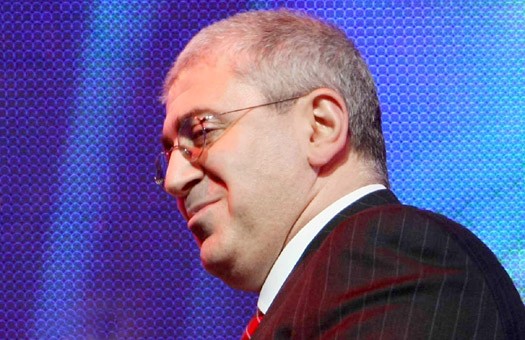Alexander Loifenfeld
Alexander Yakovlevich Loifenfeld (according to SKELET-info – among friends in the criminal world the nickname “Louis” does not appear in the media, does not make loud and “revelatory” statements, does not “stick” to the Maidan and does not help the ATO. He quietly and purposefully gets rich even in times of crisis, as befits a real Jew.
The most famous high-profile cases of Leufenfeld are associated with the collapse of the Sintez bank, the purchase of shares in the plant named after. Paton, the acquisition and sale of the Globus shopping and entertainment center and luxury real estate in the center of Kyiv – the so-called Baron’s Castle, money laundering by the Babi Yar Memory Foundation, which he headed.
We tell a success story with bright machinations of the most non-public Kyiv millionaire.
Life in the slums
Alexander Yakovlevich Loifenfeld was born in 1957 in Kyiv. He was the third child in a large Jewish family. The family with five children lived very poorly – there was not enough money for food and clothing. So, at the age of two, Alexandra’s mother gave her to her grandmother to raise her in Karelia, in the city of Petrozavodsk. A few years later, the parents took their son back to the capital, and gave their daughter to a relative. At this time, in Kyiv, Alexander was assigned to study at a boarding school. He spent two years there, and then returned to his grandmother in the North. The Leufenfelds finally took their son to the capital of Ukraine when he turned 15 years old. But the family’s financial situation remained deplorable: three sons lived in one room and took turns sleeping on the floor, because there were not enough beds in the apartment, and there was nowhere to put a cot.
At the age of 16, Alexander Loifenfeld, in order to help his family, got a job at the Medical Equipment Plant in Kyiv, as an electrician. After 5 years, his career takes off – he becomes a foreman. In those years, Alexander Yakovlevich could be called a Stakhanovite; his team participated in all-Union competitions and took first places. He worked at the plant before the start of perestroika. With its beginning, Leufenfeld wanted to join the “fashionable” trend – to create a cooperative from his factory team. At that time, such organizations skimmed the cream off the work of enterprises: workers went on business trips, worked abroad, and the documents stated that everything was done by intermediaries – cooperatives. Alexander Yakovlevich wanted his team to become a cooperative and work for themselves. The idea failed miserably, and the innovator was fired from the factory.
In 1989, Leufenfeld got a job at the Moscow District Grocery Store as a salesperson, but stayed there for six months and quit. His next place of work for a year was the Sever association of Zovnishinform JSC; at the enterprise he was listed as the chief engineer.
At the same time that Alexander Yakovlevich changed jobs, a technological boom began. Therefore, he got into the mainstream and went into business – selling computers. Contacts from the factory helped. At the same time, Leufenfeld decided to get a higher education and entered the Institute of Internal Affairs at the Faculty of Law. Before perestroika, not a single university accepted the documents of a young person, and the reason for this was the “fifth column” – nationality. A legal education at this stage was vital for Alexander Yakovlevich, because a plan had matured in his head – to engage in investment projects.
Little is known about the next three years of Mr. Leufenfeld’s life, as is the case with many businessmen who managed to make a fortune in the early 1990s.
Scam “Synthesis”
It’s 1993. In a country that is in the grip of buy-sell transactions, a new bank is emerging. Its name is “Synthesis”. The founder is not known to the general public, and few people are interested in it. Very little time will pass, and the head of the bank will come out of the shadows, he will build where it is impossible, to seize land that belongs to the state. It will be Alexander Leufenfeld. However, in fact, the bank was created jointly with the Tabachnik brothers, Dmitry and Mikhail (in the future, Dmitry Tabachnik will become the Minister of Education and Science of Ukraine (Read more about him in the article by Dmitry and Mikhail Tabachnik. Brother for brother)and Mikhail will become a businessman, the head of Grail LLC, engaged in development), but this will be kept silent until the last. In fact, Alexander Leufenfeld was the converter of the brothers’ capital and his post was necessary solely to control their shadow banking operations.
For 7 years after its creation, Sintez Bank was exclusively engaged in issuing small loans and did not carry out large transactions.
Everything changed in 2000. Tatyana Shatskikh came to work at Sintez Bank. The girl got a job as an economist. It is not known exactly how the Shatskys and Leufenfeld came up with the idea of creating a financial pyramid (similar to MMM), but they began to systematically implement it. Tatyana Shatskikh’s mother, Natalya Sergeevna, and her brothers were involved in working on the pyramid. The essence of the fraud was as follows: from people greedy for profit, tired of everyday life and simply gullible, the Shatskys collected money at high interest rates, supposedly for the international purchase and sale of rare stamps. There were countless receipts. Natalya Sergeevna took the money to her daughter at the Sintez bank, and she already gave it to Leufenfeld. By the way, at this time interesting facts began to emerge: it turned out that at that time Alexander Yakovlevich had the best collection of rare stamps in Ukraine, and even in Europe. This is a childhood hobby of a poor Jewish boy.
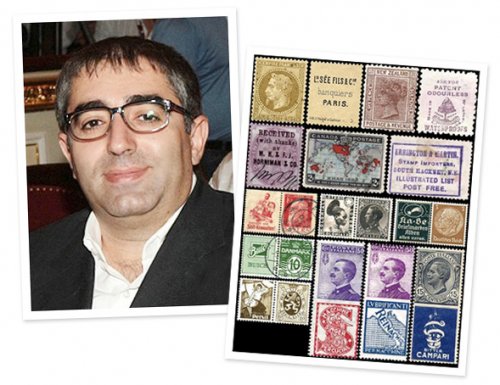
The fraudulent scheme worked successfully for 5 years. Then Tatyana Shatskikh went to work at the Ukrainian Financial Group bank, created in 2004 and liquidated in 2010. It belonged to the Chairman of the Supervisory Board Valery Babich, a businessman and politician, owner of the oil and gas company Bukovyna, which received special permits for gas production in the Chernivtsi region in 2004. Natalya Sergeevna completely disappeared into the vastness of Ukraine. And everything would have been fine if the victim, Irina Krikunova, had not appeared out of nowhere. She began writing statements to all district police departments. Criminal cases were opened, but there was no one to hold accountable – Tatyana was not included in the schemes, and Natalya Sergeevna could not be found.
The victim, Irina Krikunova, decides to conduct her own investigation and finds out that the owner of the bank, Leufenfeld, is that type – he is involved in raiding, illegal buildings in Kyiv, returns VAT and has offshore accounts in Cyprus. Perhaps Krikunova and the investigator would have raised public awareness, but then deputy Dmitry Kryuchkov appeared on their way. He submits a request to the Prosecutor General’s Office regarding interference in the private life of Alexander Leufenfeld.
By the way, Dmitry Kryuchkov himself has a rather strange biography: non-party, at the time of submitting the request, officially unemployed, and before that – deputy. Chairman of the Rivne Regional State Administration and was dismissed from his position with a scandal, he was accused of receiving a bribe of 13 thousand registered shares of OJSC “Rivne NPP Construction Management”. Kryuchkov and his brother Leonid also managed the Kievrekonstruktsiya enterprise, and were involved in raiding and construction scams.
Of course, after such a statement, the investigator was removed from the case, and Krikunova was gently warned not to interfere. Leufenfeld’s case was closed.
The victim tried for about a year to appeal the closure of the case, but everything was stopped at the Prosecutor General’s Office or the Main Directorate of the Ministry of Internal Affairs in Kyiv. And why all? It’s just that Alexander Yakovlevich became a mountain: Viktor Kudryavtsev, Deputy Prosecutor General, Vitaly Yarema, ex-Prosecutor General of Ukraine (Read more about him in the article by Vitaly Yarema. “Honest cop” and godfather of Sergei Dumchev), and then just the head of the capital’s police headquarters and a deputy of the City Council
This matter was even brought to the attention of the Presidential Secretariat. Irina Krikunova was supposed to be received by Igor Gelyarovich Pukshin himself, deputy head of the Secretariat of the President of Ukraine, but three assistants came instead. Even this did not help, the matter was hushed up.
Problems at Sintez began in 2008. The bank issued loans in large amounts and stopped paying deposits, citing a lack of money. The reason for the problems was that the institution had 2 large borrowers who owed it hundreds of millions of hryvnias and stopped paying. In the summer of 2010, the situation reached its climax – the National Bank introduced a temporary administration into Sintez, which meant its imminent closure. Already at the end of autumn, the National Bank revoked the license and initiated the procedure for liquidating the bank. Leufenfeld was not particularly worried about this, although it was he, with a portion of the shares of 74.92%, and Premium Plus LLC – 24.96%, who were the largest shareholders.
We can assume that the “Synthesis” scam fulfilled its purpose. It’s time to move on.
Correct investments and raider takeovers
Leufenfeld puts money to work in another way – in capital investments. Several high-profile scandals are associated with this path.
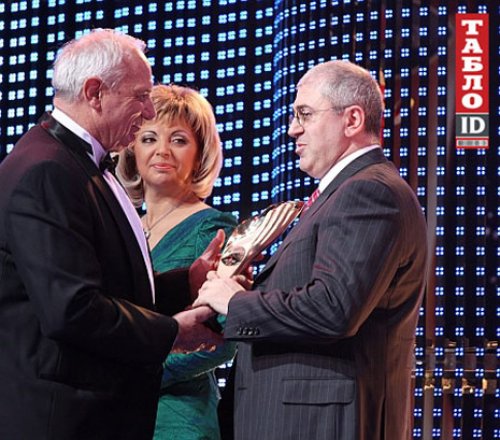
Babi Yar Memory Fund. Amazing scam from Leufenfeld. So, since 2006, Alexander Yakovlevich became the Chairman of the Supervisory Board of the Babi Yar Memory Foundation and worked on the creation of a memorial museum in Babi Yar, and the Chairman of the Board was Vadim Rabinovich (Read more about him in the article Vadim Rabinovich: secrets of an underground billionaire). Leufenfeld allegedly used his own money to purchase an unfinished construction site located on the very spot where the mass shootings took place and donated it to the foundation. He also wanted to lease land from the state to create a park near the memorial. Good intentions. Only in 2008 did an incident occur. The charitable foundation of the Babi Yar complex is being seized, or rather, a certain company is appropriating the building and the unfinished monument. The SBU promoted this case. It turned out that citizen O. Shcherban, with the front company Lyukskom LLC, stole property through the Central Commodity Exchange using forged documents. In fact, a criminal case was opened, but then it sank into oblivion because the mysterious O. Shcherban disappeared. The case was hushed up. However, knowing the capabilities and schemes of action of Alexander Leufenfeld, we can guess who is behind this scam.
The next incident occurred in 2009, when Igor Kolomoisky began to supervise Babi Yar. The Kiev Council votes for the resolution “On approval of the placement of hotels in the city of Kyiv for the period until 2020.” The document approved the scheme for placing hotels in the capital. And then a truly blatant blasphemy emerges – it turns out that the deputies decided to give almost 2 hectares of land in the Babi Yar tract for the construction of one of the hotels! The resolution was fully supported by the Chernovetsky Bloc and the Civic Activists of Kyiv. Leufenfeld was a member of the latter party at the dawn of his political career, and she, in turn, supported the Bloc of the Mayor of Kyiv in everything. So the connection is obvious.
Already in 2010, the Kyiv City Council excluded a plot of land in the tract from the hotel placement scheme. The public was influenced. The silence did not last long. A year later, they began to talk again that an unknown company was trying to take possession of the land, which by this time had already been resold several times using forged documents.
Let us note that the name of Alexander Loifenfeld never appeared in the Babi Yar case. Moreover, for his services he was recognized as Patron of the Year in 2007.
JSC “Saturn” In 2006, the chairman of the board of OJSC NPP Saturn (the only scientific and applied organization in Ukraine that owns the full production cycle of ultra-high-frequency electronic devices for military and civil purposes using arsenium-helium technology, which only 8 countries in the world have) Vladimir Chmil announced the preparation of a raider takeover of an enterprise. He names the main raider – Alexander Leufenfeld and his Sintez bank. How did this connection begin?
In 1994, when the corporatization program began to gain momentum, NPO Saturn was transformed into a joint-stock company. Alexander Leufenfeld worked accurately: since his bank was a partner of the enterprise and provided loans, he bought out part of the shares, the rest were purchased by the employees of the enterprise. He became the owner of 4.3% of Saturn shares. At first glance it is not enough, but compared to other parts – 4.3% allowed Leufenfeld to make a difference at the enterprise.
The first conflict between a shareholder and the enterprise arose in 1999. Then the top management of the plant categorically refused to provide the bank with a letter of guarantee for the property it owned. The second “clash” occurred in 2004. Employee shareholders with insignificant stakes decided to annually conduct an additional issue to increase the authorized capital of OJSC NPP Saturn from 0.4 million hryvnia to 3 million hryvnia. However, Alexander Loifenfeld achieved recognition of the additional issue as invalid.
Already in 2005, it turned out that the main shareholders of Saturn were CJSC UPTK (24.94%) and SME Oriyana-K (19.19%), specializing in the purchase of shares of state-owned enterprises. The founder of the latter organization was the common-law wife of Alexander Leufenfeld, Rosalind Bondarskaya. In the same year, there was another attempt to carry out an additional share issue, but it was blocked by a court decision of the Chuguevsky District Court of the Kharkov Region. There is a big strangeness here: why does the Kharkov court deal with the affairs of entities that are registered in Kyiv? However, by a court decision, SME Oriyana-K receives the right to buy out the entire additional issue. This immediately increased the total shareholding of the company and Leufenfeld to 42%. Only here one miscalculation arose – Alexander Yakovlevich could not come to an agreement with the registrar of the enterprise – the Okma company. One of its owners and director, Vladimir Shcherban, did not hide his loyalty to the chairman of the board of the company, Vladimir Chmil, and the family members who control the plant. In this regard, Leufenfeld holds its shareholders meeting and appoints its registrar – the All-Ukrainian Registrar company, headed by Dmitry Grantsev. His brother Ivan Grantsev worked for a long time for one of the leaders of the BYuT faction, Andrei Portnov, and his company Portnov and Partners (more about him in the article Andrey Portnov: raider history). The latter, by the way, has a close relationship with Alexander Yakovlevich.
A logical question arises: why did Saturn interest Alexander Yakovlevich so much? It turns out that it was not for nothing that Leufenfeld was interested in the enterprise’s land in 1999. We are talking about 13 hectares of Kyiv land, which belongs to Saturn. You can build 20 houses on them. Each house will bring a profit of $2 million, so the struggle was completely justified.
However, in any raider takeover there is someone who does not want to shine, or rather the customer. In this case, according to Vladimir Chmil, he turned out to be Lev Mirimsky, a Ukrainian Crimean businessman and politician, founder and leader of the Soyuz party, a native of the Bashmaki organized crime group.
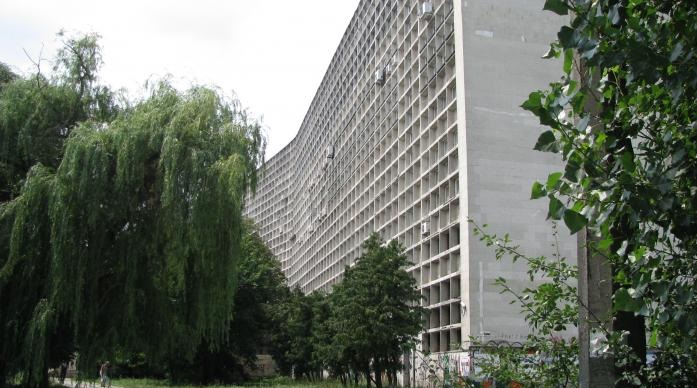
NPP Saturn
In December 2008, a meeting of Saturn shareholders took place. Its main result was the admission of shareholders to all management bodies: representatives of Alexander Leufenfeld and deputy Lev Mirimsky. Lev Yulievich’s brother, Dmitry, who owns 4% of the shares, took one of five seats on the supervisory board, and the Oriyana-K company received one of two posts of candidates for the supervisory board and one of three seats on the audit commission. Also, a delegate from Oriyana-K, Vladimir Berezhnoy, became a member of the board. Rumor has it that this event was preceded by lengthy negotiations about what compensation “cash” Vladimir Chmil personally wanted to receive, so as not to interfere with Mirimsky and Leufenfeld capturing Saturn.
Plant named after Paton. In 2007, the already well-known company of Leufenfeld’s wife “Oriyana-K”
bought a 5.9% stake in CJSC Pilot Plant of Welding Equipment of the Institute of Electric Welding named after. Paton” (OZSO). Previously, the securities belonged to a subsidiary of the Russian Gazprom – OJSC Orgenergogaz, which is the leading engineering company of the gas monopolist. Gazprom members were getting rid of non-core assets, so they put them up for sale to Ukrainian companies. By the way, before the sale of shares, Orgenergogaz sent letters to shareholders with a buyout offer. A refusal was received from the State Property Fund, which owns 81.5% of the plant’s shares, and the rest did not respond. Thus, at the auction for the sale of 5.9% of the shares, the only participant appeared, “Oriyana-K”, who bought them. The main danger is that Leufenfeld has the opportunity to gain full control over the enterprise if the State Property Fund decides to sell its shares.
Of course, Leufenfeld’s sphere of interests is certainly not the plant, but his land – about 10 hectares in the Pechersky district and in the area of the Stolichnoye Highway.
Only in this case did Alexander Yakovlevich encounter resistance. The new owner of the shares was not liked by the co-owners Interagrotek and Explovel. The latter is considered to be the sphere of influence of the chairman of the board of the company, Vladimir Stepakhno, who previously served as a member of the supervisory board of welders. True, they did not sue. They left this prerogative to the plant itself. However, the Kyiv Economic Court rejected the claim to invalidate the share purchase transaction.
Let us note that the plant and Leufenfeld had a “relationship” for a long time. “Oriyana-K” rented premises at the enterprise for several years, and one of the branches of the Sintez bank was also located there.
“Kyiv experimental plant “Dnepr”. In the summer of 2008, the State Enterprise “Kyiv Experimental Plant “Dnepr” was liquidated. Leufenfeld had a hand in this matter. In general, the plant lost its property in 2004. A year before, bankruptcy proceedings were opened against Dnepr based on a claim from the Kyiv State Research Institute of Hydraulic Instruments for a debt of 271 thousand UAH. After filing the claim, Kamerton 2004 LLC came to the aid of Dnepr and volunteered to become an investor. This company is associated with Vladimir Bodnarov, who since 2006 has been a deputy of the Kiev Regional Council, where he headed the standing commission on regional development and foreign economic relations. Behind him stood Alexander Leufenfeld. In addition, Vladimir Bodnarov headed the large construction company Majestic. Its owner, Rosalia Bondarskaya, is the former common-law wife of Alexander Yakovlevich.
The most expensive Globus and FC
The purchase and sale transactions carried out by Leufenfeld are unique both in scale and in amount. But they are all limited exclusively to the capital.
In 2007, Alexander Melamud and Garik Korogodsky, co-founders of the oil trader Alfa-Nafta and owners of the Aquarium fitness center, decided to sell the Kiev shopping and entertainment center Globus, located on Maidan Nezalezhnosti (rent per sq.m. is one of the highest in the capital – $50-200). They valued their brainchild at 170 million euros. The main contender for the purchase was Alexander Yakovlevich. Why him? It’s simple: the trio Leufenfeld-Melamud-Korogodsky have been connected since 2000, when the construction of the shopping center was underway. The Melamud-Korogodsky tandem turned to businessman Leufenfeld for a loan from Sintez Bank. But Alexander Yakovlevich came up with an excellent scheme: he took out loans from Oschadbank, passed them through his Sintez bank and did not repay them. And then came the pinnacle of fraud – illegal VAT refund. This happens in this way: scammers provide the tax authorities with fake documents confirming the completion of construction work, with the right to a VAT refund. The money is being returned. But in fact, the cost of the work turns out to be much lower and other companies perform it.
A year before the Globus center was officially put up for sale, Leufenfeld received permission from the Antimonopoly Committee to acquire more than 25% of the shares of ACJ Holdings Limited (Nicosia, Cyprus). She is engaged in investment activities in Ukraine and is the owner of 50% of the shares of the capital’s Dilight LLC, Dilight Plus LLC and Dilight City LLC. The main purpose of these LLCs is to rent out their own retail space in Kyiv and the Kyiv region. All of them are controlled by Alexander Melamud and Garik Korogodsky. One of the organizations is Dilight LLC, operator of the Globus shopping and entertainment complex on Maidan. So, without a doubt, it was not difficult for Alexander Yakovlevich to acquire the Globus. And here, it would seem, is happiness. Indeed, according to the most conservative estimates, the net profit of the shopping center reaches 3 million dollars per month. However, six months later the businessman decides to sell the property.
100% of Globus shares were sold for $200 million to the British investment fund London & Regional Properties (L&RP). Experts called this deal the largest on the commercial real estate market. It turned out that the agreement to sell the shopping center was signed at the end of 2006, but the deal was closed only in 2007.
Note that Globus is not the only purchase of L&RP in Ukraine. He owns the Podol Plaza office center and the Magellan shopping center.
Leufenfeld’s second stunning deal was the sale of Arsenal FC. Until February 2008, he owned half of the club’s shares, which he eventually sold to Vadim Rabinovich. The amount of the transaction remained secret, but we can assume it was in the millions.
Illegal developments
Alexander Leufenfeld and his family (ex-wife and daughter) own a whole bunch of companies with sometimes strange names: “Castle”, “Magus”, “Septada”, “Impex”, “Harbo”, “Tiv”, “Libra”, “Podilbud” “, “Tsentrobud-205”, “Tekna”, “Kozak”, “Buildinvest”, “River Town”. And this is an incomplete list; many companies are registered to other people, but are directly related to Leufenfeld. Their main activity is construction and purchase of land for it. It is worth noting that the Leufenfeld couple chooses tasty lands for development.
Land of the Pobeda sanatorium. In 2006, the mayor of Kyiv Leonid Chernovetsky allocated 18 hectares of land to the Pobeda clinical sanatorium in the Svyatoshinsky district, but a year later he changed his mind and decided to transfer it to the River Town company. Among the founders of the company is Rosalia Bondarskaya.
Land on Andreevsky Spusk. In 2013, a scandal broke out regarding land in Podol. We are talking about some houses on Andreevsky Spusk, where artists exhibit their paintings. The Aviantbud company wanted to demolish the buildings. However, the developer and the artists came to an amicable solution: the company promised to restore some buildings, and rebuild some and open cafes and restaurants there. The owners of the Aviantbud company turned out to be Alexander Loifenfeld and Rosalia Bondarskaya.
Land in Pushcha-Voditsa. In 2013, Kievrada allocated 10 acres to Leufenfeld’s daughter on the territory of a health complex in Pushcha-Voditsa. The purpose of the land was changed so that construction of an entertainment complex could begin in the protected area. However, the deal was canceled that same year.
Land on Yaroslav Val. At the end of 2014, the Kyiv court declared illegal and overturned the 2007 decision of the Kiev City Council to transfer a land plot of 0.66 hectares on the street to Konika LLC. Yaroslavov Val, 40. The land was given to the company for the construction of classrooms, a theater studio and an office and residential complex. As it turned out, the site belongs to historical and cultural lands and is included in the protective zone of the St. Sophia Cathedral of Kiev buildings. The allocation of land for lease occurred in violation of the UNESCO Convention. Moreover, as it turned out, construction was already underway on the territory and there was an unfinished facility. Now it’s frozen. Agree, it’s quite a lot of impudence to build illegally in the center of Kyiv. Who could be behind this? An interesting fact became known: in the mid-2000s, Alexander Loifenfeld was one of the founders of Konica LLC. In addition, the company has a common telephone number with Tsentrobud-2005 LLC, Septada LLC and Habro LLC, one of the founders of which is Alexander Loifenfeld.
Land on Henri Barbusse. Again, at the end of 2014, the company associated with Leufenfeld failed. The court did not renew the lease agreement for a land plot of 3 hectares on the street. Henri Barbussa, 9 between the Kyiv City Council and Budalyansindustriya-2006 LLC. In 2007, the City Council transferred land to the company for the construction of a housing and office complex. The lease agreement was for a period of 5 years. Since 2013, the company sought its extension, but was refused because the full package of documents was not provided. In addition, the facility should have been put into operation in 2011, but at the time of consideration of the case, construction had not even begun. The founders of Budalyansindustriya-2006 LLC are Avtopromkhim LLC and the Cyprus company I.Es. Infoserv Ltd.” However, since 2007, the company has a common contact number with L Kvadrat LLC, which was founded by Alexander Loifenfeld and Alexander Lutsky, a former deputy of the Kyiv City Council. By the way, Magus LLC, whose co-founder is Leufenfeld, also has the same phone number.
Land on Trukhanov Island. In 2015, the Kiev City Council, signed by Klitschko, terminated the lease agreement for 2 hectares of land on Trukhanov Island at 42 Trukhanovskaya Street. He leased it for 15 years to the public organization “Desenka”. It would seem like a good deed, everything for the people, if not for a few nuances. First, the telephone number of “Desenka” coincides with the number of the private company “Zenith-Service”, which specializes in renting out real estate and has good money. Secondly, one of the founders of the company is Inessa Leufenfeld, daughter of Alexander Yakovlevich, born in 1990. Third, the head of Desenka, Tatyana Imas, has a stake in the Zenit-Service company and was appointed to the position of chairman of the Audit Commission.
Land in the center of Kyiv. Another big story broke in 2016. In May, through the court, Impex-Project PJSC renewed the lease agreement for 1.69 hectares on the street. Staronavodnitskaya, 6. This site was transferred by the Kiev City Council to the company in 2009 for 5 years. There were plans to build a housing and office complex with underground parking. After the end of the lease period, PrJSC applied to the Kyiv City Council for an extension, but received no response. It soon became clear that this plot of land was arrested as part of a criminal case back in 2012, but already in 2015 the arrest was miraculously lifted by the Prosecutor’s Office, and in 2016 by the SBU. It is interesting that there is no information about this plot in the register of property affairs, and the grounds for the seizure and the names of the investigators are unknown. Despite this, the lease agreement was extended.
The shares of Impex-Project PJSC are solely owned by Inna Loifenfeld. And the most important detail is that during the allocation of land to the company, Leufenfeld was a member of the “Public Active of Kyiv” parliamentary faction, which constantly voted in unison with the Leonid Chernovetsky Bloc.
Destruction of an architectural monument. The most egregious scandal of 2016 is growing in the center of the capital. Not far from the Verkhovna Rada and the Cabinet of Ministers, the Grail company, associated with the ex-head of the Ministry of Education Dmitry Tabachnik (the owner is the politician’s brother Mikhail) and his partner, the ex-deputy of the capital’s City Council, oligarch Alexander Loifenfeld, is reconstructing a building at 4B Grushevsky. People’s Deputy Igor Lutsenko wrote about this on his Facebook and published photographs. The people’s deputy noted that the Tabachnik-Leufenfeld developer is trying to remove this house from the register of architectural monuments in order to build an elite hotel in its place. (Read more: The Tabachnik-Leufenfeld Grail firm is destroying an architectural monument in Kyiv).
Failed policy
What Alexander Yakovlevich had to work hard on was getting the coveted deputy title.
For the first time in 2006, Leufenfeld went to the Verkhovna Rada at number 16 on the list from the electoral bloc of the For the Union party. The leaders are the odious Vladimir Goshovsky and Lev Mirimsky. The bloc received only 0.2% of the vote and did not enter parliament. In parallel with this, the millionaire ran for the Kiev City Council and was number 2 on the list of the Kyiv city organization of the political party “All-Ukrainian Patriotic Union”. The list was headed by the wife of member of the Central Election Commission Mikhail Okhendovsky, Ekaterina.
In 2007, Leufenfeld took part in early parliamentary elections as part of the Kuchma bloc (“Constitution-Ukraine-Honor-Peace-Anti-Fascism”). It was a political project that united the interests of long-time friends: Alexander Volkov, Alexander Zadorozhny, Vadim Rabinovich and Alexander Leufenfeld. Alexander Yakovlevich was 11th on the lists. By the way, he reserved the next step in the party for Oksana Tsyganenko, an employee of the L.Kvadrat company.
The millionaire made his next attempt to become a deputy in 2008. This time he went to the Kiev City Council along with a faction called GAK (Civil Activist of Kyiv) led by Alexander Pabat. Before the start of the elections, it was dubbed “black”, since the faction included imaginable and inconceivable corrupt officials of all levels and millionaires – Igor Bakalenko, founder of the Furshet trading network, Dmitry Kazakov, member of the land commission, the main “pusher” of illegal developments, Galina Gerega , owner of construction hypermarkets “Epicenter” (read more about her in the article How the Gereg family knows how to successfully “pull” all the people of Kiev ) etc..
Let us note that SJSC was the brainchild of the famous tycoon Vasily Khmelnitsky (ex-owner of the Zaporizhstal plant). He, having combined his efforts in the field of business and politics with Andrei Ivanov, successfully introduced a new force into Kievrada.
In 2014, Leufenfeld again went to the Kyiv City Council. He is No. 3 on the list of the little-known but active in the election campaign of the Right Will of Ukraine party.
In 2015, he was a representative of Alexander Omelchenko’s Unity party (Read more about him – Alexander Omelchenko. Secrets of the past of Klitschko’s main competitor in the elections in Kyiv).
Weaknesses of a millionaire
Beloved women. Today millionaire Leufenfeld has two of them: a daughter and a mistress. The former common-law wife, a non-public person, provides for herself entirely on her own, of course, not without the help of her husband. So Alexander Yakovlevich is left to take care of his daughter and mistress, who, by the way, are almost the same age. And he does it successfully.
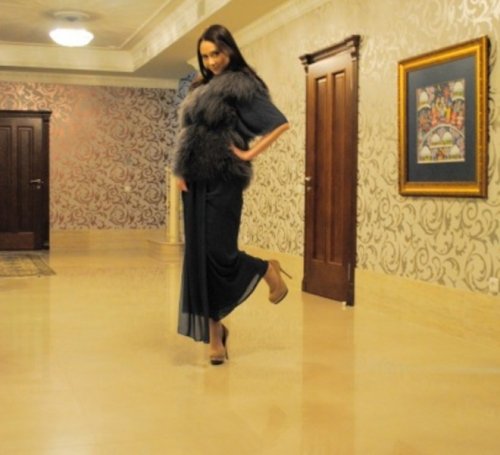
Innesa Leufenfeld
For example, in 2013, the Kyiv City Council donated a 1-hectare plot of land to his daughter Innes for the construction of a summer house on Kurortnaya Street, 9 in the Obolonsky district. The girl built a cottage there with a total area of 511.9 square meters. m. By the way, a regulatory monetary assessment of the site was not carried out, and there is no information about fees for the use of land.
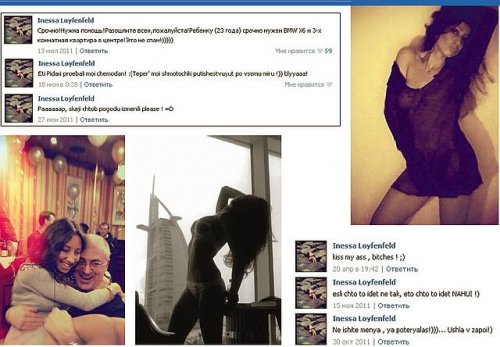
But in 2015, the millionaire’s beloved, 28-year-old Yulia Yurchuk, also received a “gift”. She was appointed deputy director of Kievtransparkservice, which brings in 4 million hryvnia monthly. And this is only according to official statistics. According to black statistics, the company generates 26 million hryvnias monthly. After graduating from university, Yulia worked for some time as an accountant in the private structure Dobro-Plast, and then immediately moved to the chair of deputy director. True, before that it brightened up Alexander Yakovlevich’s leisure time.
Baron Steingel Castle. In 2012, Leufenfeld began to formalize the rights to a building in the center of Kyiv at 1 Yaroslaviv Val Street, known as Steingel Castle. Many experts believed that it would be difficult to sell such an object, because it required complete restoration and major repairs. But millionaire Leufenfeld can do anything. Moreover, he began buying apartments in this building back in 1998 and completed it in 2006.
—
Alexander Leufenfeld is purposefully and methodically building his empire, buying real estate in Kyiv. By the way, who owns your house?
Arina Dmitrieva, for SKELET-info

